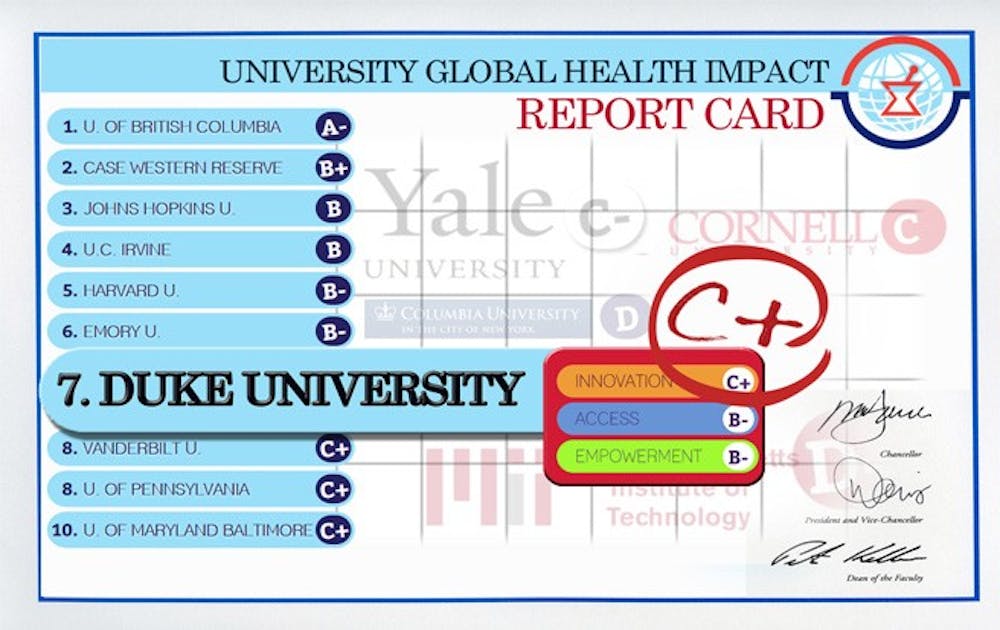When ranking universities’ global health impact, the Universities Allied for Essential Medicines gave Duke a C+.
The University Global Health Impact Report Card is the first of its kind administered by the UAEM, which aims to promote medical innovation and public interest in global health. The report card was released April 4 as part of the organization’s first systematic initiative to assess research institutes’ global health impact. Only universities in the United States and Canada were evaluated for the report card.
Although Duke received a C+ for its overall global health impact, the University was ranked seventh out of the 54 universities evaluated.
“Because we were looking at a range of institutions... we tried to really use metrics that could be compared in a standard way across institutions,” said Bryan Collinsworth, UAEM’s executive director.
The cumulative grade each university received was determined by its scores in three categories—innovation, access and empowerment. Duke received a C+ in innovation and a B- in both access and empowerment, giving the University an overall grade of C+. Duke, which was ranked seventh, followed schools such as Harvard University and Emory University, ranked five and six respectively. The only school that did not fall within the B range was the University of British Columbia, which claimed first place with an A-.
Dr. Anthony So, a UAEM advisory board member and director of the Program on Global Health and Technology Access, noted the importance of the report card in making Duke’s research globally relevant.
“The University Global Health Impact Report Card makes knowledge in the service of society a measurable milestone,” So, who is also professor of the practice of public policy and global health, wrote in an email Tuesday. “It will help universities to aspire to better translate discoveries from bench to bedside—prioritizing research and licensing inventions to better reach the millions in need of life-saving technologies for global health.”
MD/MBA candidate Manisha Bhattacharya, a member of the Duke Global Health Institute’s student council, said she was not surprised by Duke receiving a C+ because it is difficult to assess how a university’s intellectual property will affect global health.
Chris Paul, Ph.D candidate in environmental policy and doctoral student at the Duke Global Health Institute, noted his discontent with Duke’s grade because the report card failed to assess programs aside from research that have a positive impact on global health.
“I’m disappointed with this narrow assessment of Duke’s efforts in work abroad and specifically global health.... Duke’s active global health efforts are not only by the University and medical school,” Paul wrote in an email Wednesday. “Duke could do more to support the study of neglected tropical diseases and other health concerns for the world’s poorest, but the many programs that get Duke students to work in low-resource settings and reflect on their experiences are critical in global health training.”
Paul noted, however, that the University’s new global health curriculum is a good step in preparing undergraduates to make a positive difference in global health.
Global health will be offered as a co-major and minor for the first time in the Fall. As a co-major, global health cannot stand alone and must be paired with another major of the student’s choice.
Bhattacharya said the changes in Duke’s curriculum are a potential source of improvement for the University.
“The major and minor is a really big step for Duke,” Bhattacharya said. “The fact that it’s a co-major is an opportunity for students to combine necessary knowledge and bring it to their understanding of global health.”
For universities who hope to improve their global health grade, the UAEM website outlines many ways universities can elevate their score, such as increasing the number of individuals who research diseases prevalent in poorer regions, such as typhoid.
“The report card can allow Duke to see what our role is in creating social impact through all of the wonderful research work that’s done at our University [and] how can we align our policies to maximize [our] social impact, ” Bhattacharya said.
Get The Chronicle straight to your inbox
Signup for our weekly newsletter. Cancel at any time.

